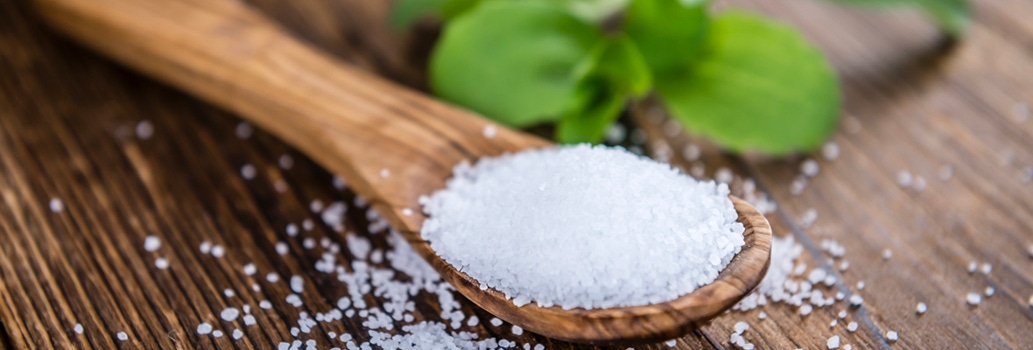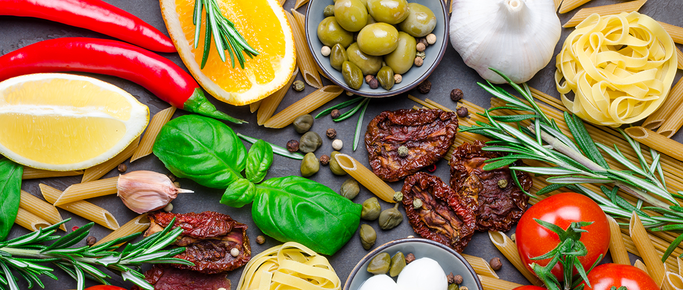
Natural sweeteners - are they better for your health?
Artificial sweeteners, which became popular in the 90s, were made from synthetic sugar substitutes. Many of the new generation of sweeteners come from plants. They contain no calories (or very few) and are extremely sweet, which means you don’t need much at all.
Here’s our guide to the most common natural intense sweeteners being used in food products.
STEVIA
What is it?Stevia is the common name for steviol glycosides. These are extracted from the leaves of a South American plant, Stevia rebaudiana Bertoni, which has been grown for its sweetness and medicinal purposes for centuries. Stevia is thought to be 250-300 times as sweet as white sugar.
Calories?
None.
Side effects?
None. Stevia was approved for use in Australia in 2008.
Is it good for me?
Actually, yes. Compared to sugar, stevia has no impact on blood glucose levels, which can be beneficial for people with diabetes.
Which products use Stevia?
Australia and New Zealand food laws permit stevia to be added to a range of foods including breakfast cereals, flavoured dairy and soy milks, yoghurts and frozen desserts.
MONK FRUIT EXTRACT
What is it?This sweetener is created by removing the skin and seeds of the monk fruit and crushing them to create a juice that is dried into a concentrated powder. The monk fruit is native to southeast Asia and gets its sweet taste from antioxidants called mogrosides. Monk fruit sweetener does not contain fructose or glucose and is very sweet - 100-250 times sweeter than sugar.
Calories?
None.
Side effects?
None.
Is it good for me?
Possibly. It’s likely to have health benefits due to its antioxidant and anti-inflammatory properties (due to the mogrosides), however, more human research is required.
Which products use monk fruit extract?
Australia and New Zealand food laws permit addition of monk fruit extract to be added to a range of foods including flavoured dairy and soy milks, yoghurts, frozen desserts, breakfast cereals.
ERYTHRITOL
What is it? Erythritol is a polyol or ‘sugar alcohol’, that is found naturally in mushrooms and certain fruits like grapes and melons. It’s also produced commercially by fermenting corn or sugar beets. Contrary to the description ‘sugar alcohol’, erythritol is neither a sugar nor alcohol. It’s about 70% as sweet as sugar, looks like sugar and it has no after taste.
Calories?
Almost none, but is often labelled as having 0.2g calories per gram.
Side effects?
Erythritol, as a polyol, cannot be completely digested by the body and eating too much of any type of polyol may have a laxative effect. It is thought that erythritol is better tolerated than other types of polyols.
Is it good for me?
Erythritol is safe for adults and children, as well as people with diabetes.
What products use erythritol?
Erythritol is permitted to be added to a range of foods and is commonly seen in confectionary, desserts and beverages.
Ultimately, natural intense sweeteners should not be giving you permission to go crazy on the sweets. It’s still important to ensure your diet is made up of largely plant-based foods, packed with fruits, vegetables, wholegrains, nuts and legumes.
ARE SWEETENERS BETTER FOR ME THAN SUGAR?
The key to both sweeteners and sugar is moderate consumption.However, if you’re looking to cut calories but don’t want to miss out on the sweet stuff, natural intense sweeteners can provide a low or no calorie alternative. Sweeteners also don’t contribute to tooth decay and cavities. However, it’s still important to check a product’s nutrition panel.
ARE SWEETENERS SUITABLE FOR PEOPLE WITH DIABETES?
Small amounts of sugar can be included as part of a healthy eating plan if you have diabetes. Sweeteners, like stevia, can also play a helpful role, especially when they are replacing large amounts of sugar. Try to reduce the amount of sweeteners you use over time – your taste buds will gradually change and you’ll find the natural sweetness of wholefoods is enough for you.HOW TO COOK WITH NATURAL SWEETENERS
Can you use natural sweeteners instead of sugar for cooking and baking? Absolutely! But it's important to realise that the end result may not be identical to the same product made with sugar.
Sugar does more than just make foods and beverages taste sweet. In baked goods such as cakes, cookies and brownies, sugar helps add volume as well as trap and hold moisture. For example when baking bread, sugar can help to feed the yeast that provides leavening.
Natural sweeteners on the other hand, while very sweet, don't have the same properties as table sugar. You might notice that cakes, breads and muffins made with sugar substitutes, may not have the same volume and might appear more flat.
Stevia: These sweeteners are suitable for baking but can't replace sugar cup for cup in recipes. It's best to leave at least 1/4 cup of sugar in the recipe to help with browning and providing volume. You might need a lower baking temperature and a longer baking time, but it depends on the manufacturer.
Monk fruit extract: This sweetener is heat stable making it suitable for cooking and baking. It can be substituted for sugar in sauces, dressings and beverages. For baking, some manufacturers recommend substituting monk fruit extract for half the sugar in a recipe but it depends on the brand.
Erythritol: Quick breads and muffins are an excellent option when using erythritol as a sugar substitute as well as for fruit pies and cakes. Erythritol can be measured cup for cup for table sugar, but is only about 70% as sweet as sugar. Some brands recommend using erythritol as a 50% replacement for sugar.

The latest nutrition advice, plus health and wellness tips delivered to your inbox monthly

